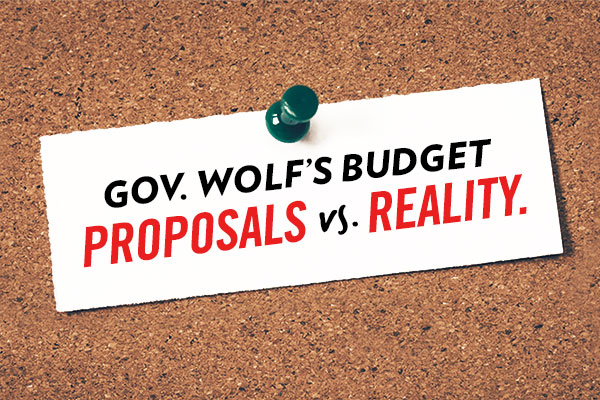Media

How to Craft a Responsible Budget
Under Gov. Wolf, total state spending has risen by nearly $5.3 billion. This includes more than $2.9 billion in new General Fund spending—a sum exceeding the combined spending increases of the prior eight years. The remaining amount—approximately $2.2 billion—is the result of unchecked spending growth in the state’s shadow budget.
The governor’s insistence on expanding the size of government has led to tax hikes on working people, small business closures, and an overall failure to revitalize Pennsylvania’s economy. Despite the consequences of this tax-and-spend approach, Gov. Wolf is offering another budget with unsustainable spending increases and a $250 million energy tax.
Lawmakers should reject the governor’s plan and support a fiscally responsible budget that does not raise taxes on families. Such a budget would keep spending growth limited to the Taxpayer Protection Act (TPA) index. The index would allow for a $422 million General Fund spending increase. Gov. Wolf’s plan blows through this spending cap easily.
It’s important to note the TPA only imposes a ceiling on spending growth. The legislature could keep spending increases below the ceiling or reduce overall spending through a variety of reforms. Here are just several options:
- Eliminate corporate welfare
- Reducing non-essential spending in the shadow budget
- Enact welfare reform
- Expand school choice options
- Overhaul the commonwealth’s criminal justice system to reduce over-incarceration
These and other recommendations would control spending and avoid harmful tax increases, more borrowing, and another unbalanced budget.
The state’s poorly-performing economy needs a boost. Restraining spending can improve the state’s finances and pave the way for tax reform, which will grow the economy if it allows for more private investment in productive industries.
The past three years have included frustrating budget impasses, numerous tax hike proposals, unbalanced budgets, and large spending increases. This year can be different if the legislature enacts a pro-taxpayer budget aimed at maximizing Pennsylvania’s potential.